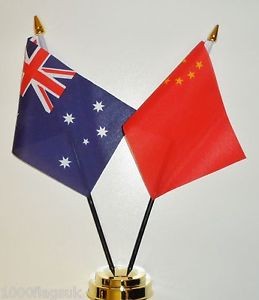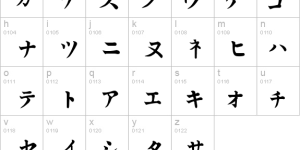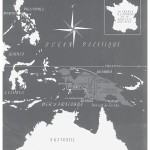My Story ~ 21. Reborn ~ New Family, New Vision And New Career
No comments yet “Attitude and environment are like a double-edged sword, it can kill a person but it can also create a new life. I thank myself for the firmness and persistence in those early years…”
“Attitude and environment are like a double-edged sword, it can kill a person but it can also create a new life. I thank myself for the firmness and persistence in those early years…”
I was born in Anhui Province and graduated from university in China. I taught at the university after completing my master’s degree. My husband came to Australia for further study. To be with my husband, I came to Australia in November 1995.
It seemed to me like a fairy tale when I first arrived here: everything was so short and small; there were only a few high-rise buildings in the city area, the traffic light pillars were made from short wooden piles, which looked so cute and interesting. Australia has a beautiful environment, clean air and bright sunshine – that was my first impression of Australia.
Later on things became more difficult. The first problem was the language. My major back home was Russian; I had no English foundation at all, so it was difficult for me even to go shopping. I did not watch TV at home because I couldn’t understand anything, let alone chat with my neighbors. After a while, I decided to learn English, not only for the basic life needs, but also to lay a foundation for future work. So I began an English course in 1996, it was the beginning of a new life.
The second problem was work; it was very difficult for me to find a job at first. No jobs were suitable for me to do due to my limited skills and language ability. I needed work for an income; I have done all sorts of work. I worked in Chinese restaurants as a waitress, washing dishes from noon till nine o’clock in the evening, 7 days a week, there were times when I stood at the sink washing so many dishes, and I felt just like a robot. It was not easy for me as I had never done that type of work before; I was very slow at the beginning. What’s worse, I often broke dishes while washing them, and I had to pay for them by a deduction from my already very low wages. In the end, I had very little money left to take home.
My boss got to know that I was living a very hard life with a family to raise, he was kind to me and didn’t make me pay for the first few bowls that I broke. However, I kept on breaking dishes while washing them and my boss lost his patience and temper. Once he even shouted at me angrily: “You are so stupid, you don’t even know how to wash dishes! Go home if you can’t do simple work like this!” I was embarrassed, feeling tired and sad, tears running down my face. I dried my tears with the greasy sleeves and continued washing the endless dishes. Soon I improved a lot, both in quantity and quality. I could continue washing dishes for seven hours and didn’t break any dishes for weeks. I have worked in numerous restaurants, Italian or Chinese, nearly every restaurant in Chinatown. I also worked as a household cleaner, even if I didn’t know how to keep my own house tidy and clean. I survived those hard days with my firmness and persistence.
The main reason I came to Australia was to reunite with my husband, but after only a short period of time, we separated due to a marriage with no love foundation and our different personalities. That was an important life experience for me, coping with a failed marriage, makes you appreciate the second marriage more.
I met my present husband at the language school in 1996; we were in the same English class. He came from Iraq. He was a trained army bodyguard in Iraq, very tall and strong. He survived the Iraqi war luckily by crossing the border with his mother’s help and escaped to Saudi Arabia. After he was captured by the US army, he stayed in a refugee camp for five years. In the camp he mixed with political refugees from other Arabic regions and other countries. He told me that he learned a lot from many people in the camp, including politicians, film directors and actors, etc. who told him stories and lent him books to read. He felt as if he was studying at a comprehensive university and even forgot that he was actually living in a refugee camp. He then came to Australia having been granted political asylum.
His spoken English was much better than mine, he was younger and knew no English before coming here, like a piece of blank paper he learned fast. I was older and I often mixed English with Russian which was my first foreign language. But my reading and writing were better than his, so we could help each other and complement each other’s shortcomings. Our knowledge systems and way of thinking seemed to be quite different, probably caused by his self-taught methods while in the refugee camp whereas I was educated in a formal education system in China. We got married in 2005. It was more for the sake of status, my husband wanted to have both of our names on the property certificate. Actually it didn’t matter to me, I never took the paper work of a marriage as the most important part of a relationship. As a matter of fact, I prefer to be more independent and I need my own space. However, I always feel grateful to my husband who played the key role in the turning point of my Australian life. Why? Without him, I could not have achieved all the successes of today – a lawyer, a councilor, a mother and wife.
I remember, we were pretty poor when we started to live together. I had just completed my English course and wanted to go to a university for further study. I was always interested in politics, so I was planning to study law, a course called “Australian government”. There were two choices for me at that time, the law course, which was a three year full time course; or a secretarial course which was only six months course. If I chose to be a secretary, I could go to work after six months and earn money for our family. But my interest was law, it was a future goal for me. I was in a difficult situation but I didn’t want to ask my husband for his opinion. My husband didn’t wait for me to ask but said to me: “I know you are interested in law, I think you should make your decision to pursue the law course. Go for it, don’t worry about our current situation. Home is here as long as I’m here. You have my full support”. With his caring and loving words, I made up my mind and enrolled in the law course in the Curtin University. From then on, my husband became a carer, taking over all the household chores, while letting me concentrate on my study. The course was hard at the beginning; I couldn’t understand what the professors were saying in the lectures. But, with my determination and hardwork I passed all five exams. I became pregnant after the first semester; we had our first son in the second semester. I returned to study only two weeks after giving birth to my baby. My husband played the key role at that time, he looked after the baby while I was studying, even though he also had to work to raise money to support our family. So he should share more than half of my achievements. Without him, or if he had considered money as a priority, I would probably had chosen the secretarial course. It would have been much easier for the financial situation for our family, but I could never have achieved what I have today. I thank my husband for his loving care and his sense of responsibility, his sacrifice and contribution to our marriage. We have never depended on the government’s welfare benefits but relied on each other’s support. But talking about cultural differences and understanding, we still have a lot of problems every now and then.
We have been together for over 19 years now, we have two lovely sons, we love each other, but we have not integrated with each other’s culture, life style and customs. As a leading member of the Australian Women’s Association, I have been planning to hold a forum with “Cross Marriages” as the topic. From my own experience, I would like to tell people, in particular, those Chinese women who plan to go for a cross-cultural marriage, you need to be fully prepared before making the decision, including physically, mentally and culturally. Each nation has its culture, and traditions. There are conflicts in the society, but more obvious are the family dynamics. I’m straight forward in my approach to things, I always say what I think whereas my husband is more like many Australian men, who love women to say nice and sweet things to them, a quality I lack. The other issue is customs and family tradition, his family is so different from our Chinese family, they think a family should share everything, no need to ask before taking things from each other, yours is mine and mine is yours. I understand this to be a cultural difference. I remember, once his younger sister came to Australia for a holiday and stayed in our house, she took all my handbags to her room without asking me. When I asked my husband about it, he treated it very lightly and told me that family should share everything and there were no secrets between family members. Financially, I am the bread winner for our family; I spend as much as I want, sometimes my husband is not so happy about that. I also think I am more open minded than my husband. Yet I don’t think this is a cultural difference, it is more personality and part of me. We put our money together but he doesn’t know how much we have because most of the money has been earned by me. However, he doesn’t like my casual way of spending money. He says even if I am the main income earner, I should consider the whole family. I remember one year there was a policy that the Australian government would subsidize half the cost if you bought a car for business usage. So I bought a BMW without discussing the purchase with my husband because I knew he would disagree. We fight sometimes but we care for each other just like other husbands and wives. Maybe it is more difficult for cross marriage couples as there are more issues between them, just like in our marriage.
My husband is now studying law at TAFE as he is also interested in law and politics. But he will never take it on as a career. He just wants to know more and see if he can help me with my work. As a professional woman, I know there must be some side effects on the family. The husband complains that the wife spends little time at home, cares less for the children but more for her job, etc. But in a cross marriage, there will be other problems. After being in a cross marriage for so many years, I suggest that if a woman wants to get married, she should try to find a man from her own country first, or at least find a man with the same language.
Next we talk about immigration. To me it is important for every immigrant, including myself, that we should cherish the opportunity that the host country has provided for us, even if we are facing many challenges all the time. You must think independently and don’t give up or have doubts about yourself. I always treasure the opportunities that Australia has provided for me. If you can live your life and choose your way according to your own will, no one can stop you from doing the right thing. The real obstacles come from within. Be strong and have faith in yourself, you will achieve your goal. That is my experience since immigrating to Australia. To me, attitude and environment are like a double-edged sword, it can kill a person but it can also create a new life. I thank myself for the firmness and persistence in those years.
Now I’m a lawyer with many other social roles. I am a city councilor and have been in charge of marketing, finance and international relations since 2012. I own a law firm and run an immigration news paper. I am the vice-president of Australian Immigrant Association and the president of Western Australian Immigrant Association. I not only have to care for the interests of our members, but also have to organise training programs. I need to communicate with the Immigration Department and State Government to resolve community and other problems. I have to attend many meetings and take full charge of many issues; I travel in and out of the state many times a year. I understand that people trust me and it is my responsibility to do the right things. Since the 8th March, 2013, I have held the position of the president of the National Women’s Association of Australia. We hold an activity on the 8th March every year, focusing on women’s issues. For the next activity, we will arrange for those women who are financially independent to help those women who are not independent but wish to be successful and achieve their own independence. In the coming four to five years, I hope that we can assist women to achieve higher political and social status in Australia. I also hope I can be a representative for all the Chinese women in Australia to achieve our common goals.
People ask me how I have integrated into the Australian society. Well, it’s hard to explain clearly using only a few sentences. But the most important point is that you just have to make your decision, to do the job with your heart, like my own experience, from washing dishes to studying law at the university, to running my own business; to working in the government, to be responsible for myself, for my family and for society. Be yourself and do the right thing, and in the meantime, don’t forget that you also represent your own country- the country you came from. As long as you work hard and are willing to use your intelligence and share your wisdom with others, you can get along with any one you meet. I find Australia is a good place to live; it is much easier to deal with Australian people, who live in a simple and direct environment while we Chinese have the habit to compete with each other for success. In terms of social relationships, you will find that you gain respect if you respect other people. Only sincere and open communications can develop into a long term relationship. Yet China has her many great traditions, one tradition is we Chinese always show gratitude and never forget those who have helped us while many foreigners probably do not consider it to be so important, or maybe they do not show their gratitude in an obvious way. For example, Australian people are very happy and easily accept a dinner invitation but they don’t usually reciprocate like the Chinese people do. Australian people might think that we find that acceptable but I still think it’s polite and good manners to repay with a dinner. If you are nice to a Chinese person, he or she will be nicer to you with a higher level of respect. Chinese people value mutual respect while not every foreigner knows that is the case. So I think we should carry our good traditions forward and help more people within our capability and to the best of our ability. Although not everyone will help you in return, they will look on you as a friend and remember you in their hearts, a good relationship will grow and last for a long time.
I have been living in Australia for over 19 years now. I have a happy family with my husband and our two children. I consider Australia to be my home. But with my parents and sisters back in China, I still treasure China as my home too. So I have two homes. As for cultural identity, I think I’m still Chinese in my blood and I’m Australian from the perspective of law. I will modestly accept Australian culture and try to absorb the excellent features of Australian life.
As a Chinese immigrant, I think the greatest advantage is that we can learn from our two cultures to improve ourselves and achieve perfection.
You May Also Like
Comments
Leave a Reply









